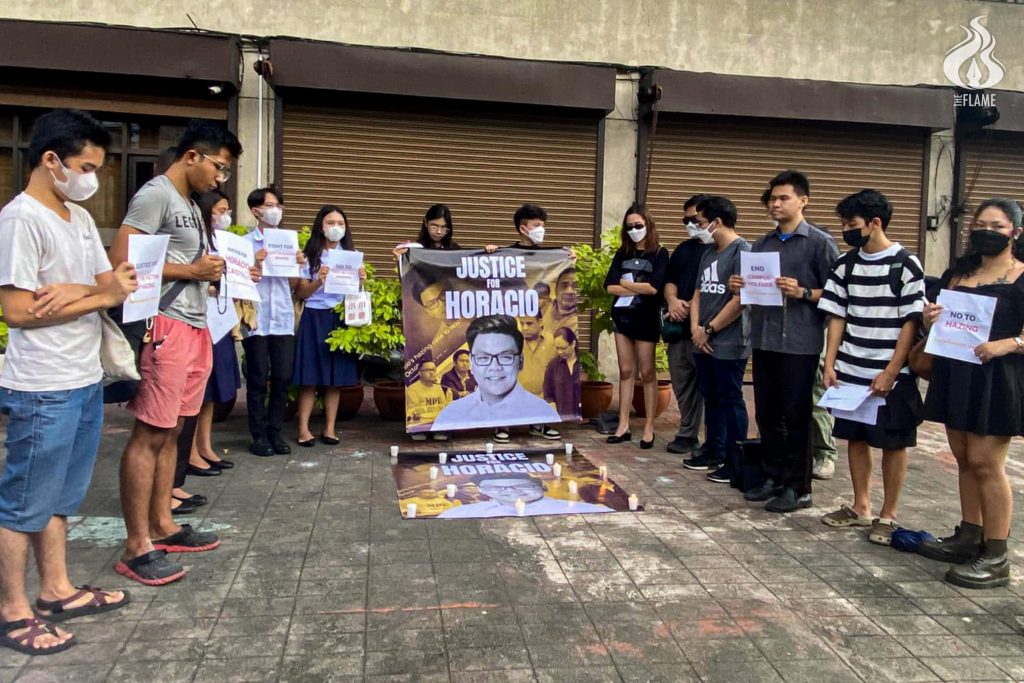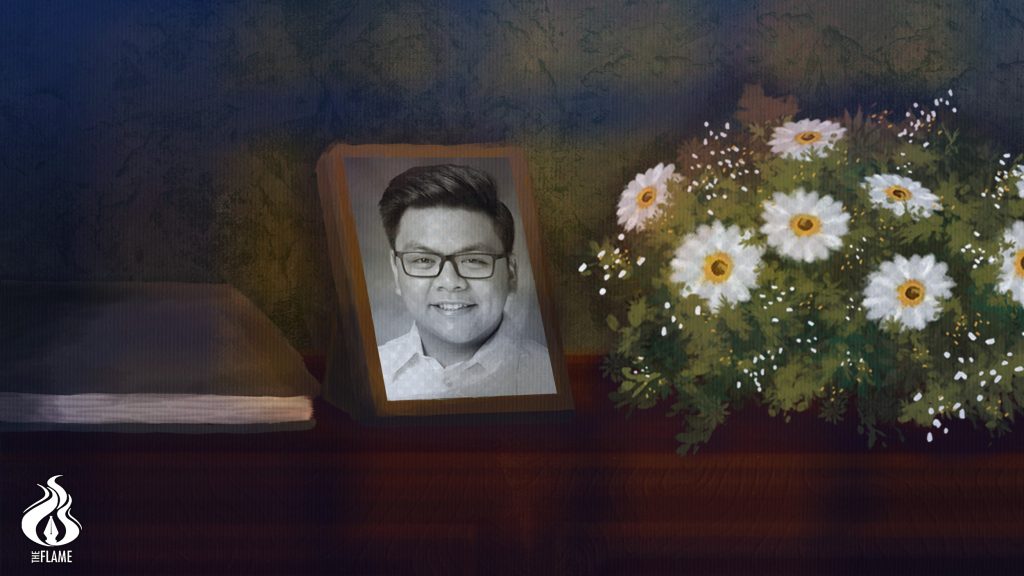CARMINA CASTILLO’S faith in the justice system found a new lease of life, ironically, inside the coffin-shaped city hall that houses the Manila Regional Trial Court.
The court found the ten Aegis Juris fraternity members linked to the death of her son UST law student Horacio “Atio” Castillo III guilty of violating the Anti-Hazing Law, ending her family’s seven-year wait for a ruling on the case.
The fraternity men, collectively known as the “Aegis 10,” were sentenced with life imprisonment and were ordered to pay the Castillo family over P600,000 in damages and civil indemnity, according to the ruling made public last Oct. 1.
The usually quiet room of the Manila Regional Trial Court Branch 11 was filled with both anguished and joyful cries after the word “guilty” was read from the dispositive portion of the decision penned by Judge Shirley Paglilauan.
After the waiting and the sentencing, which took about an hour, the camps of the Castillos and the Aegis 10 left the court with contrasting fates.
Carmina and her husband walked out of the courtroom doors triumphantly while raising a copy of the ruling for all the throng of reporters and advocacy group members to see.

The convicted fraternity men composed of Arvin Balag, Mhin Wei Chan, Axel Munro Hipe, Oliver John Audrey Onofre, Joshua Joriel Macabali, Ralph Trangia, Robin Ramos, Jose Miguel Salamat, Danielle Hans Matthew Rodrigo and Mercelino Bagtang, Jr., walked out of the building covering their faces with their hands and towels, their yellow shirts with “PDL” (person deprived of liberty) printed at the back distinguishing them from the rest of the crowd. The teary-eyed parents of the frat men held out their hands as they tried to clutch into their sons who were being taken away by the police.
Carmina gave her sister an affirming nod — and then a tight hug. The head of the Volunteers Against Crime and Corruption raised a thumbs up to the crowd while their other companions held their heads low and muffled their cries.

“It (ruling) strengthened my faith in our justice system. That all those seven years, it may seem long but it (justice) was still delivered,” Carmina told The Flame.
“It was as if I passed a very difficult test… It was like a sigh of relief,” she added.
The court noted that Section 4 of the Anti-Hazing Law of 1995 states that fraternity members who inflicted physical harm are liable for the death of a person who was subjected to hazing or other forms of initiation rites.
“The untimely death of Atio caused pain, agony, anxiety, suffering and mental anguish to his heirs because it deprived them [of] his company, love, support and companionship,” the ruling read.
After the release of the ruling, students of the UST Faculty of Arts and Letters, where Atio finished his Political Science degree, wore black ribbons distributed by The Political Science Forum to remember his death.
Thomasians also offered a prayer for Atio outside the old office of the Aegis Juris fraternity along Navara Street.

Fatal rites
Atio last communicated with his parents on Sept. 16, 2017, when he sent a text message informing them that he would attend a welcome party hosted by a group from the UST Faculty of Civil Law. Subsequent reports revealed it was an Aegis Juris fraternity initiation rite.
Mark Ventura, a fraternity member-turned-state witness, said the initiation rites began at 2 a.m. on Sept. 17, 2017, when Atio performed the duck walk. Six members took turns and punched Atio’s arms for about 30 minutes after the duck walk. He was then hit by a spatula to stop the bleeding.
The 22-year-old law student was asked to sing and dance to the song “Baby Shark” while drinking raw egg yolk, which he was told was the saliva of various fraternity men.
At about 5 a.m., Aegis Juris members hit Atio with three paddles. The fifth blow, which was reportedly struck by Balag, the head of the fraternity, left Atio unconscious. The fraternity men used white candles to drip wax beside Atio’s ankles in an attempt to resuscitate him, but it proved to be futile.
According to a crime report, the Aegis Juris members brought Atio to the Chinese General Hospital at 9 a.m., four hours after he was beaten with paddles.
John Paul Solano, a medical technologist and a UST law student who was on a leave of absence at that time, initially claimed to have found Atio lying on a pavement at about 7:50 a.m. wrapped in a blanket, at the corner of H. Lopez Boulevard and Infanta Street, in Tondo.
Solano reportedly received phone calls from Balag informing him that someone had collapsed during the initiation rites and asking him to go to the fraternity’s library at Laon Laan Street. Solano tried to revive Atio through cardiopulmonary resuscitation or CPR.
However, Solano was found guilty of obstruction of justice after making inconsistent statements about his discovery of Atio’s body and was sentenced with two to four-year imprisonment in 2019.
On Nov. 9, 2017, nearly two months after the hazing incident, the Manila Police District released its final medico-legal report stating that Atio had died of severe blunt traumatic injuries as a result of hazing.
The Aegis Juris members linked to Atio’s death had asked the court to dismiss the hazing case against them but the motion was junked in 2022 for lack of merit.
Castillo camp: UST failed as second parents
While the ruling is widely seen as a warning to fraternities, Carmina said schools should undertake reforms that would prevent hazing incidents.
She said she is holding UST responsible for her son’s death as it should have practiced “due diligence.”
“We are holding them responsible for what they did to our son. They failed as second parents. They should have prevented hazing, crime hazing from happening,” Carmina told reporters after the release of the ruling.
“Being the representative, being the elders, they should’ve guided their younger brods and they have been practicing hazing so we’re holding them responsible.”
Atio’s mother expressed hope that the case would yield a long-term effect by setting a precedent for future cases.
According to her, UST should overhaul its policies and ensure that administrators are not affiliated with fraternities, sororities and similar organizations to avoid biases in decision-making.
UST Faculty of Civil Law Dean Nilo Divina, an alumnus of the Aegis Juris fraternity, said the University has always upheld policies to promote the safety and welfare of all students.
“I respectfully disagree with the statement of Mrs. Carmina Castillo that UST and the Faculty of Civil Law failed in their duty to protect her son… Unfortunately, no institution is spared from the actions of individuals who choose to disregard these measures,” he said.
Horacio Castillo, Jr., Atio’s father, also challenged UST, saying the ruling proved the existence of fraternities and hazing in the University.
“Now the ball is in their hands. It’s a big challenge now to UST… It cannot be denied, the court made a very stern [ruling],” he said.
“It took seven years, but it was well worth it.”
‘Painful’ silence
The ruling drew reactions from numerous groups and politicians but Carmina pointed out that an important party was conspicuously silent on the development.
According to her, UST’s silence on the court decision was “painful” as his son was a dedicated Thomasian.
“[H]ow come they are alienating somebody who graduated from the University who’s an alumnus, who dedicated his college career in a school? He loved the school. But, you know, what pains me is why does it seem like he’s being set aside?” Carmina told The Flame.
“Seven years have passed and they still have nothing—until now, they haven’t said anything. And now it’s given them a decision of conviction… Dean Divina said something but how come there is none from the school itself?” she added.
The Flame has reached out to UST administrators for comment but has yet to receive a response.
Carmina said the University has to answer why Aegis Juris, which practiced hazing, was recognized as an organization.
“Clearly, hazing happened. Hazing is a practice of Aegis Juris. How was it able to recruit? How was it able to be recognized? Answer all my questions,” she said.
The need for changes in a system that condones violence was the main theme of various statements on the conviction of the “Aegis 10.”
The Political Science Forum, an organization Atio used to head, welcomed the ruling, saying it was a condemnation of fraternity violence. It also expressed hope that the guilty ruling would put an end to “cultures that exist because of fraternities, such as violence, patriarchy, nepotism and corruption.”
“These cultures worsen the rotten system in our country that favors those with power, connection and financial capability,” the student organization said.
Asst. Prof. Ma. Zenia Rodriguez, the Political Science program coordinator during Atio’s undergraduate years, said the guilty ruling was a “strong message” that would serve as a call to fortify policies in educational institutions.
Sen. Juan Miguel Zubiri urged state agencies to intensify public awareness about the dangers and legal consequences of fraternity hazing.
“I think (last Tuesday’s) conviction, after seven long years, is something that will really be, I’d say, a deterrence,” he said.
“Alongside the pursuit of justice for other hazing victims, we must also ensure that our institutions, including schools and law enforcement agencies, work diligently to eliminate hazing,” he added.
Bagong Henerasyon party-list Rep. Bernadette Herrera, one of the authors of the Anti-Hazing Law, said she expects the convicted fraternity men to appeal the decision and that she trusts that the justice department would prepare well for it.
Carmina said she and her husband would pay close attention to how UST would respond to the ruling before thinking about possible legal actions.
“We will still be talking about it. We will still assess everything, but I leave it to the University as a challenge. You know, maybe if they can take it upon themselves to…make the changes themselves, right? Then why don’t they start it already?” she said. F — Joss Gabriel Oliveros and Veancy Palad with reports from Von Zyron Alimorong





